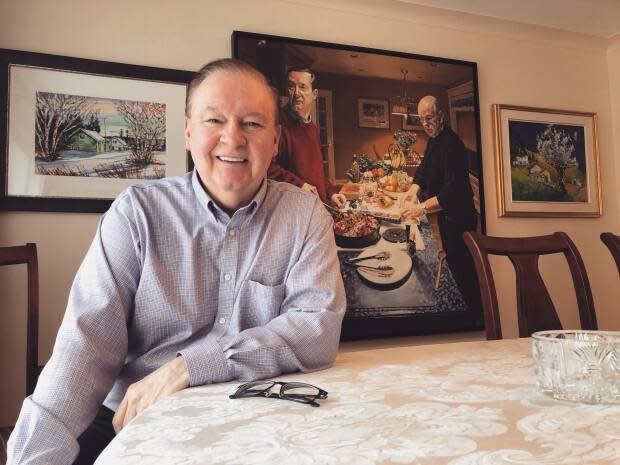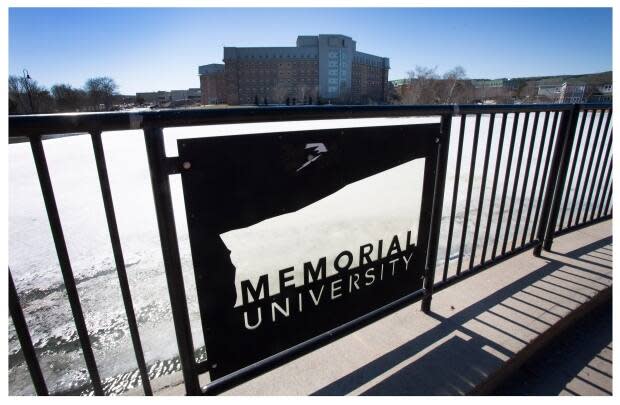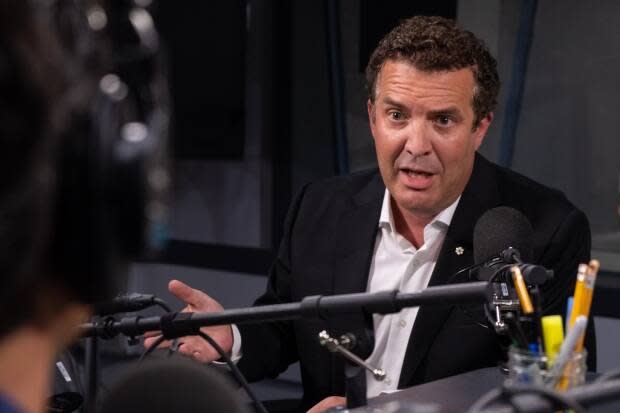Karl Wells celebrates namesake LGBT scholarship, reflects on progress

A former CBC broadcaster, who once feared for his reputation in the workplace because of his sexuality, is now offering funding to pave the way for upcoming scholars to study LGBT rights.
Career journalist-turned-food critic Karl Wells says he's funding the new Memorial University scholarship to shed "as much light as possible on every topic" relating to the LGBT community.
"I fear ignorance and misinformation," Wells told the St. John's Morning Show.
Nel Jayson Santos, a master of arts student in sociology, is the inaugural recipient of the Karl M. Wells Scholarship in LGBTQ2S+ Studies, an acronym that includes people who identify as homosexual, bisexual, transgender, two-spirited and questioning.
The $2,000 award will be offered annually to students in Memorial University's faculty of humanities and social sciences whose work reflects a commitment to LGBT matters.

'I can't be myself in this workplace.'
Wells said he felt the sting of society's ignorance as a gay man living in a less tolerant time.
"When I was in high school, homosexuality was illegal," he said. "You could actually go to jail just for being gay. Think about that."
Before 1969, Canada's Criminal Code considered "gross indecency" — meaning same-sex relations — an indictable offence worthy of five years' imprisonment.
Wells remembers when gay bars were about the only safe space for a queer man, and one had to be careful frequenting them.
Because his sexuality was "no secret," Wells says there was no escaping the sneering remarks of colleagues.
"Even though I was working for the Canadian Broadcasting Corporation, which I thought was a very accepting, tolerant liberal organization, there was homophobia," he said.
"I just realized I can't be myself in this workplace."

A platform for change
But being hired at the CBC would prove a pivotal turning point for Wells.
"I realized that I was being given a huge platform," he said. "I thought, 'The best the best thing I can do is be a wonderful example for the gay community.' I don't know whether I succeeded or not."
As far as comedian Rick Mercer is concerned, he did.
"When I was a kid, one of my professional aspirations was TV," Mercer said. "I didn't know how to reconcile that with being gay."
He recalls a memory in which his friend Andrew Younghusband pointed out Karl Wells' house, which he shared with his partner. Mercer found Younghusband's nonchalance discussing a gay couple comforting, and Wells' visibility, inspiring.
"Being gay wasn't going to stop Karl Wells from being on TV," Mercer said to himself, "so it was not going to stop me."

Not there yet
On the occasion of their 40th anniversary in 2019, Wells and his husband, Larry Kelly, shared a photo of themselves on social media.
The response was a snapshot of how attitudes have evolved since the not-so-distant days when being in a same-sex relationship constituted a crime the law considered equal in severity to the abduction of a newborn baby.
"It got hundreds and hundreds of likes and wonderful comments," Wells said of the photo — including a "lovely" one from then premier Dwight Ball.
But among the many well wishes, one in particular caught Wells' attention: "This is disgusting," one man wrote.
"I just thought, 'Oh, my God, this was a photograph of two people who've been together for 40-odd years, in love,'" Wells said, "and so it just made me think, 'Yeah, we're not there yet.'"
Despite some discouraging news he's heard lately — the Springdale sidewalk rainbow controversy, for instance, or reports of a gay couple being turned away from a rural N.L. B&B — Wells is holding out hope.
He looks forward to a day in the future when LGBT people are accepted by society at large.
"I think we're a ways from that," he said, "but I'm hopeful."

 Yahoo Finance
Yahoo Finance 